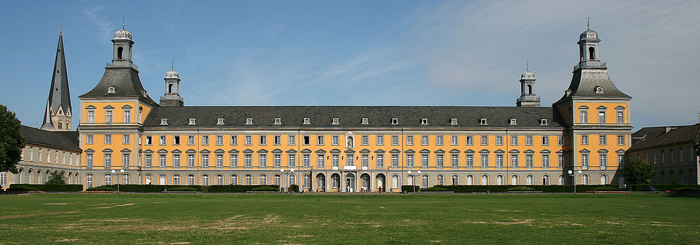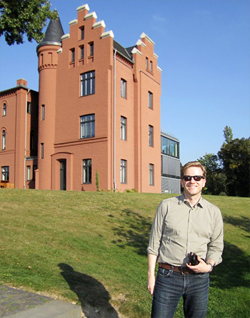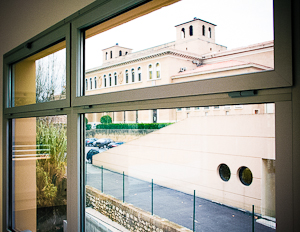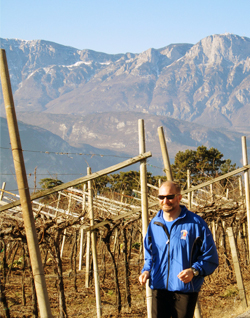
This semester, the Faculty welcomes back several members who have been away on academic sabbaticals and research fellowships during the last academic year. As visiting scholars, these McGill professors have had the opportunity to disseminate their ideas abroad, while absorbing the fresh ideas and approaches particular to their host universities. Having had time to percolate intellectually, our returning professors now bring those refreshing international flavours home. Here are three short reports they sent us from abroad.
Professor Helge Dedek writes from the Käte Hamburger Centre of Advanced Study in Bonn, Germany:
“Greetings from Bonn! Since September 2011, I have been spending an exciting and inspiring research leave as a Fellow at the Käte Hamburger Centre of Advanced Study. Under the heading ‘Law as Culture’ (an ideal fit for a McGillian!) the Centre, funded by the German Federal Ministry of Education and Research, brings together international scholars from different disciplines—currently, a theologian, a philosopher, a sociologist, a legal anthropologist, and me, a legal historian—to pursue their research and to regularly exchange ideas in weekly workshops and presentations.

I have been working on a project entitled ‘Rights as Culture: The Western Legal Tradition as a Culture of Individual Rights.’ During my fellowship, I have so far presented results of this research at the University of Oxford, Osgoode Hall Law School, and the University of Toronto; before I return to Montreal, I am scheduled to present at the Universities of Maastricht, Frankfurt, Bonn and Cologne. Let’s see how the Continental listeners will react—it’s always fascinating to see how the different national academic cultures influence in which aspects audiences are most interested.
The Käte Hamburger Centre, named after Jewish-German émigré literature scholar Käte Hamburger, is located in a beautifully refurbished old mansion, right on the scenic banks of the River Rhine—a little secluded, like an advanced studies institute should be to create an intense work atmosphere. At the same time, the Centre is affiliated to the University of Bonn and thus closely connected to its vibrant intellectual life. Founded in 1821, it is one of Germany’s younger universities, yet one of the country’s most reputable institutions of higher learning.
During my stay, I’m residing at the ‘University Club’, where the apartments are curiously named after famous scholars who taught here, including Joseph Schumpeter, August Schlegel, Joseph Ratzinger, and five Nobel prize-winning scientists. Alumni include, for example, Karl Marx, Heinrich Heine, and Jürgen Habermas. I was first supposed to stay at the ‘Nietzsche Apartment’, but fortunately, I was relocated to the ‘Heinrich Hertz Apartment’ – definitely better vibes…
In the area of legal studies, Bonn is famous for its contribution to historical jurisprudence: Classics scholar Barthold Niebuhr, for example, discovered Gaius’s ‘Institutes’, and Paul Krüger devised, together with Theodor Mommsen, the still-authoritative edition of Justinian’s Digest. Infamous jurist Carl Schmitt taught at the Law Faculty as well: to be sure, no room is named after him!”
—Helge
Le professeur Frédéric Mégret (Chaire de recherche du Canada en droits de la personne et pluralisme juridique) écrit de l’Université Paul-Cézanne, en France:

« Un bonjour de la Provence où je me suis retiré pour écrire sans trop de distractions (à part le chant des cigales). Même si je n’ai pas fini d’écrire le livre dont je rêvais, j’ai profité du petit bureau qu’on m’avait alloué à l’Université Paul Cézanne pour mener à terme plusieurs projets d’écriture commencés depuis trop longtemps.
Mon année sabbatique a également été riche en déplacements. J’ai reçu certaines invitations plus inattendues, dont celle de Sa Sainteté Aram Ier, primat du catholicossat de la Grande Maison de Cilicie à Beyrouth, qui souhaitait discuter des façons de réclamer le retour de certains biens de l’Église orthodoxe arménienne confisqués pendant le génocide.
J’ai passé du temps sur la Place Tahrir à l’occasion d’une conférence sur « Le droit international et la périphérie », dont il a fallu changer le lieu à cause d’une grève des étudiants égyptiens qui protestaient contre les événements de Port Said. J’ai participé à Cambridge au lancement de l’ouvrage The Cambridge Companion to International Law auquel j’avais contribué un chapitre, et à un événement organisé par la Haute école d’art et de design de Genève sur les monuments et la justice transitionnelle. J’ai séjourné à Florence avec de hauts magistrats pour réfléchir à l’évolution du rôle des juges internationaux; j’ai donné un cours intensif sur la protection des minorités à l’Université Catholique de Lille et un autre sur le droit international des droits de la personne à Oxford. J’ai conseillé une ONG qui travaille sur la responsabilité de l’ONU à la suite de l’épidémie de malaria causée par des Casques bleus à Haïti, et j’ai témoigné devant le Conseil de l’Europe à titre d’expert sur les droits des aînés.
Cette année sabbatique s’est vite envolée, mais j’en retiens surtout le plaisir d’avoir eu du temps de lire plus que d’habitude et de laisser aux idées la chance d’émerger! »
—Frédéric
Professors Geneviève Saumier and David Lametti (Director, Centre for Intellectual Property Policy) write from the University of Trento, Italy:
“A sabbatical provides opportunities for a level of intellectual exchange and development that teaching and administrative commitments often preclude. Spending a sabbatical in another institution, in another country, affords access to new ways of thinking and new intellectual networks.

I (David) have used this opportunity develop deeper research and teaching ties with my intellectual property colleagues at the Facoltà di giurisprudenza at the Università degli Studi di Trento, in northern Italy. And I have had the intellectual time and space, not to mention SSHRC funding, to give talks at schools such as Cambridge, Harvard, Sciences Po, Geneva, EUI, La Sapienza, La Bocconi, Perugia and Bari, and this has helped me develop and write a variety of articles and a book project.
One of the advantages of being a two-colleague family is the ability to coordinate sabbaticals. But that can also pose challenges. As we both have major research grants, we each have travelled for speaking engagements, meetings and conferences; this has meant alternating periods of travel to Washington (Geneviève), Perugia (David), Heidelberg (Geneviève), Boston (David) and later Paris-Geneva, and Paris-Cambridge.
Turnovers can be tight: at least three times this year the parental baton was passed while the children were still at school! Luckily, no planes or trains were late. We like to think that our children benefit from the exclusive attention of one parent at all times (though of course they would beg to differ).
Le renouvellement intellectuel, la découverte et la production scientifique sont au cœur de l’idéal sabbatique, mais quand elle a lieu en famille à l’étranger, la richesse de cette expérience est décuplée! ”
—David & Geneviève
